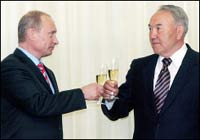Putin's trip to Asia demonstrates Russian energy power to the West
Russian President Vladimir Putin arrived in Astana, Kazakhstan, early in the morning on May 10. Putin had to fight with sleep because of inconvenient flight and considerable time difference. The president was not able to leave Moscow earlier because of Victory celebrations. He could not choose another time for visiting Kazakstan: Putin is being very cautious as far "the global energy war" is concerned.

The most peculiar thing about the visit was the fact that Kazakh President Nursultan Nazarbaev had earlier planned to visit the energy summit in Poland. The summit was dubbed as anti-Russian. The participants of the summit were said to discuss possible ways of Kazakh oil supplies to Poland and further to Europe through Azerbaijan, Georgia and Ukraine by-passing Russia. That is why the results of the talks in Astana were extremely important to both parties.
Having greeted Vladimir Putin on the porch of the presidential palace, Nursultan Nazarbaev welcomed him inside the large hall. After the hymns the presidents spent an hour discussing different political issues.
“Kazakhstan is set to widen and deepen cooperation with Russia,” said Nursultan Nazarbaev speaking in front of high-ranking officials and heads of both countries’ corporations.
Nazarbaev said that the Kazakh-Russian cooperation plan is to be approved after the talks, “however, several issues such as the transportation of Kazakh natural resources remain unsolved”.
“Kazakhstan is very interested in transporting Kazakh energy resources through Russia’ – added Nursultan Nazarbaev. It was clear that Nazarbaev spoke about the transportation of Kazakh oil to Europe.
All concerned parties were listening to there words with bated breath.
The presidents came to an agreement that the volumes of transportation of Kazakh oil to Europe through trans-Caspian pipeline would be increased from 23 to 40 mullion tons a year. Until recently, Russia has not considered such possibilities. This could mean a decrease in Russian oil export volumes. However, when the construction of the so-called “by-passing” pipeline Bourgas-Alexandroupolis began, it became possible to increase the volumes of Kazakh oil transportation.
However, oil and gas transportation issues were not the main questions on the agenda. When journalists were asked to leave the hall, Nursultan Nazarbaev greeted the guests once again and said that “the current meeting has been marked with two events of global scale.”
The first one of them is connected with Russia's and Kazakhstan's agreement to create a joint uranium enrichment centre. Kazakhstan takes part in its creation providing uranium ore. Some time ago such centers were supposed to give access to nuclear technologies to non-nuclear countries. The realization of this idea was meant to solve the Iranian nuclear crisis. However, Iran continues to play its game. Kazakhstan, in its turn, has become a pioneer in this field. Now Kazakhstan has new opportunities: the country develops its own nuclear energy industry and takes part in joint Russian-Kazakh nuclear projects conducted in other countries.
The second event of international importance was discussed at the press-conference. The presidents of Russia, Kazakhstan and Turkmenistan are holding a summit in Turkmenistan's capital, Ashgabat, on May 11 to discuss energy cooperation between the three countries.
The talks between President Vladimir Putin of Russia, President Nursultan Nazarbaev of Kazakhstan, and Turkmen President Gurbanguly Berdymukhammedov are expected to focus on the proposed construction of a pipeline that would carry natural gas from Turkmenistan through Kazakhstan and Russia to Europe.
It is widely known that the European Union and the United States insist on transporting oil from Central Asia to West European pipelines avoiding the Russian territory.
After the visit to Turkmenistan Putin will return to Kazakhstan to visit its main Caspian Sea port of Aktau May 12-15. In Turkmenistan, the Russian president will continue pushing for a gas pipeline through his country. Moscow's proposal to lay a gas pipeline from Turkmenistan, which possesses 11th largest reserves according to the Oil & Gas Journal, along the Kazakh and Russian Caspian coast is currently rivaled by a project sought by the United States, Europe and Georgia to build a pipeline under the Caspian Sea to deliver gas to southern Europe via Azerbaijan, Georgia and Turkey.
Source: aif.ru
Translated by Alexander Timoshik
Pravda.ru
Subscribe to Pravda.Ru Telegram channel, Facebook, RSS!





